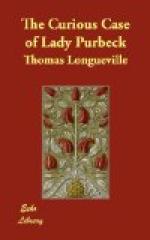FOOTNOTES:
[1] Young’s Love of Fame.
[2] Most of the matter in this chapter has been taken from The Lives of the Chief Justices of England, by John, Lord Campbell. In two volumes. London: John Murray, 1849, Vol. I., p. 239 seq., Chap. VII.
CHAPTER II.
“Now
hatred is by far the longest pleasure,
Men
love in haste, but they detest at leisure.”
Don
Juan, xiii., 16.
Rivals in love, rivals in law, rivals for place, Coke and Bacon, while nominally friends, were implacable enemies, but they sought their ends by different methods. When James I. had ascended the throne, Bacon began at once to seek his favour; but Coke took no trouble whatever for that purpose, and he was not even introduced to the royal presence until several weeks after the accession. Bacon, then a K.C., held no office during the first four years of the new reign; but his literary fame and his skilful advocacy at the Bar excited the jealousy of Coke. On one occasion, Coke grossly insulted him in the Court of Exchequer, whereupon Bacon said: “Mr. Attorney, I respect you but I fear you not; and the less you speak of your own greatness, the more I will think of it.” Coke angrily replied: “I think scorn to stand upon terms of greatness towards you, who are less than little—less than the least.”
Lord Campbell says that Sir Edward Coke’s arrogance to the whole Bar, and to all who approached him, now became almost insufferable, and that “his demeanour was particularly offensive to his rival”—Bacon. As to prisoners, “his brutal conduct ... brought permanent disgrace upon himself and upon the English Bar.” When Sir Walter Raleigh was being tried for his life, but had not yet been found guilty, Coke said to him: “Thou art the most vile and execrable traitor that ever lived. I want words sufficient to express thy viprous treasons.” When Sir Everard Digby confessed that he deserved the vilest death, but humbly begged for mercy and some moderation of justice, Coke told him that he ought “rather to admire the great moderation and mercy of the King, in that, for so exorbitant a crime, no new torture answerable thereto was devised to be inflicted upon him,” and that, as to his wife and children, he ought to desire the fulfilment of the words of the Psalm: “Let his wife be a widow and his children vagabonds: let his posterity be destroyed, and in the next generation let his name be quite put out.” According to Lord Campbell, Coke’s “arrogance of demeanour to all mankind is unparalleled.”
Towards the end of the reign of Elizabeth, Coke, as Attorney-General, had had another task well suited to his taste, that of examining the prisoners stretched on the rack, at the Tower. Volumes of examinations of prisoners under torture, in Coke’s own handwriting, are still preserved at the State Paper Office, which, says Campbell, “sufficiently attest his zeal, assiduity and hard-heartedness in the service.... He scrupulously attended to see the proper degree of pain inflicted.” Yet this severe prosecutor, bitter advocate and cruel examiner, became a Chief Justice of tolerable courtesy, moderate severity, and unimpeachable integrity.




